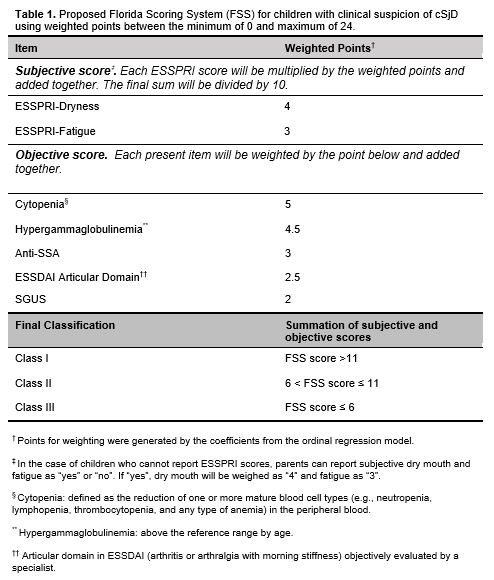Session Information
Date: Monday, November 13, 2023
Title: (1221–1255) Pediatric Rheumatology – Clinical Poster II: Connective Tissue Disease
Session Type: Poster Session B
Session Time: 9:00AM-11:00AM
Background/Purpose: Childhood Sjögren ‘s disease (cSjD) is a poorly defined systemic autoimmune disorder. Due to the absence of diagnostic criteria, heterogeneous presentations, and the dissimilarity between adult- and childhood-onset diseases, diagnosing and managing symptomatic children suspected of having cSjD is challenging. Currently, no clinical guidelines for these children are available. The study aims to propose a novel Florida Scoring System (FSS) for the stratification of heterogenous clinical and laboratory features of children with suspected cSjD condition.
Methods: A total of 191 clinical and laboratory variables from 217 patients enrolled between January 2018 and March 2022 were subject to our machine learning analysis. These patients with suspected cSjD were referred from Pediatric Rheumatology Clinics at the University of Florida (UF) in Gainesville and AdventHealth for Children in Orlando to the UF Center for Orphaned Autoimmune Disorders to rule out/rule in cSjD with further work-ups. In the absence of any established cSjD diagnostic criteria, the final cSjD diagnosis was made based on the 2016 ACR/EULAR criteria for adult SjD.Latent class analysis (LCA) was performed on 33 clinical/laboratory variables from 191 variables to stratify heterogeneous patient features. Artificial neural networks (ANN) and other machine learning models were constructed for internal validation and ranking of variable importance. Along with LCA and internal validations, causal graphical learning identified key variables, which became the foundation for the final FSS.
Results: Three distinct classes were defined by the LCA model. Machine learning models, including random forest, gradient-boosted decision tree, partial least square discriminatory analysis, LASSO-penalized ordinal regression, and ANN, accurately predicted three classes and ranked similar variable importance consistently. The causal graph model identified eight essential variables for inferring LCA-derived patient classes. FSS was developed using weighted points with a maximum of 24. As shown in Table 1,the final FSS score is the summation of subjective and objective features without requiring a lip biopsy, Schirmer test, SICCA ocular staining, and/or sialometry. If the FSS score >11, children with suspected cSjD are classified as Class I. Those with score >6 and ≤11 are classified as class II, and those with score < 6 are classified as class III. Out of the patients who fulfilled the 2016 criteria, the percentages in Classes I, II, and III were 70%, 18%, and 14%, respectively (p < 0.001). The characteristics of each class are listed in Table 2.
Conclusion: We propose the novel FSS, a physician-friendly scoring system, to stratify clinical/laboratory features of children with cSjD. Further evaluation of FSS with new cohorts will ensure the clinical usefulness of FSS for early recognition, diagnostic workup, and monitoring.
To cite this abstract in AMA style:
Thatayatikom A, Zeng W, Lovelace T, Winn N, Shah A, Schrepfer T, Bhattacharyya I, Gonik R, Benos P, Cha S. The Novel Florida Scoring System: A Machine Learning-Based Stratification of Clinical and Laboratory Features in Children with Suspected Sjögren’s Disease [abstract]. Arthritis Rheumatol. 2023; 75 (suppl 9). https://acrabstracts.org/abstract/the-novel-florida-scoring-system-a-machine-learning-based-stratification-of-clinical-and-laboratory-features-in-children-with-suspected-sjogrens-disease/. Accessed .« Back to ACR Convergence 2023
ACR Meeting Abstracts - https://acrabstracts.org/abstract/the-novel-florida-scoring-system-a-machine-learning-based-stratification-of-clinical-and-laboratory-features-in-children-with-suspected-sjogrens-disease/


